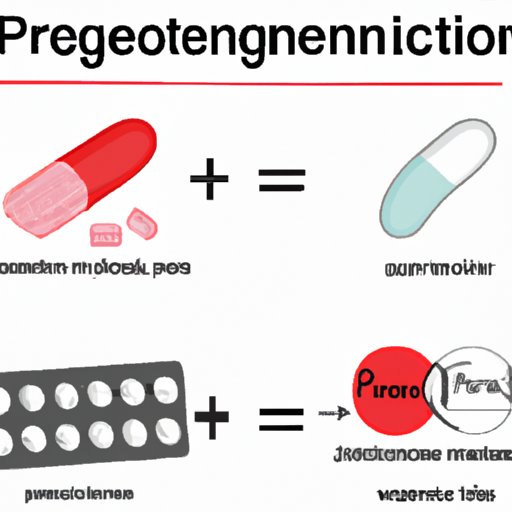
Introduction
Understanding medication use during pregnancy can be complicated, and making informed decisions is paramount to the health of both mother and baby. In this article, we’ll discuss the use of prednisone during pregnancy, including the possible risks and benefits, and how to make an informed decision.
Pregnancy and Prednisone: What to Know Before Using the Medication
Prednisone is a medication that suppresses the immune system, reduces inflammation, and relieves swollen, sore joints. It is also used to treat a variety of other conditions. While prednisone is a relatively safe medication, it’s important to consider the potential risks and benefits before taking it while pregnant.
The first step is to talk to your doctor, both to determine the most appropriate course of treatment for your condition and to receive guidance on the safe use of prednisone. Your doctor will help you weigh the risks and benefits of different treatment options, given the specific characteristics of your pregnancy.
The Effects of Prednisone on Pregnancy – Risks and Benefits
Several factors will influence your doctor’s recommendation of whether, and how much, prednisone is safe to take while pregnant. These include whether the benefits of the medication outweigh the risks, and whether there are any other options available for treating your condition.
Prednisone has been found to cross the placenta, which means it can affect the developing fetus. Possible risks to the fetus include low birth weight, increased risk of cleft palate, and developmental delays. Additionally, corticosteroids such as prednisone can decrease the production of amniotic fluid, which is essential for fetal growth and development.
Despite these risks, prednisone also has the potential to provide significant benefits for women with certain conditions such as lupus, rheumatoid arthritis, and inflammatory bowel disease. Research has shown that untreated inflammation can have a negative impact on fetal health, and so controlling these conditions may be crucial for a healthy pregnancy.
Pregnancy and Prednisone: Exploring the Controversy and Considerations
While some studies suggest that the risk of fetal harm from prednisone is relatively low, others highlight potential complications such as increased risk of gestational diabetes and elevated blood pressure.
A particularly controversial issue is whether prednisone use increases the risk of fetal malformations. While some studies suggest this is the case, others find no such association. Currently, there is no clear consensus on the subject, which means that careful consideration of the potential risks and benefits is essential.
A Guide to Taking Prednisone While Pregnant – Dos and Don’ts
If your doctor decides that prednisone is the best option for your treatment during pregnancy, there are certain things you should be aware of to help minimize the risk of complications. These include:
- Working closely with your doctor to ensure you’re taking the right dose of medication at the right time. Monitor your dose carefully, and never increase it or change your dosage without consulting your doctor first.
- Avoiding exposure to sick people as much as possible, to reduce the risk of contracting an infection while on the medication.
- Monitoring your glucose levels closely, as prednisone can increase blood sugar levels which can lead to gestational diabetes.
- Avoiding other medications that may increase the risk of fetal harm when taken with prednisone, such as non-steroidal anti-inflammatory drugs (NSAIDs).
The Science Behind Prednisone Use in Pregnancy – A Comprehensive Review
So how does prednisone work during pregnancy? Essentially, it works to suppress the immune system and reduce inflammation in the body. In pregnant women, prednisone can also help prevent preterm labor and reduce the risk of certain pregnancy complications.
It’s important to remember that while prednisone can have an impact on fetal development, so can uncontrolled inflammation. Your doctor will be able to provide you with detailed information on how prednisone works, and how it can be used to help manage your condition while minimizing risks to your baby.
Navigating Prednisone Use During Pregnancy: How to Make Informed Decisions
The decision whether to take prednisone during pregnancy is a complex one, and it’s important to take the time to explore all of your options and understand the risks and benefits involved. Some things to consider include:
- Working closely with your doctor to ensure you’re receiving the safest and most effective treatment.
- Considering your individual medical history, and your risks for complications.
- Educating yourself on prednisone, how it works, and what potential side effects may occur.
- Seeking out support from others who may be going through the same thing.
Conclusion
Pregnancy and medication use can be a tricky thing to navigate, but with the right guidance and support, it’s possible to improve your chances of a healthy outcome. By working closely with your doctor and taking the time to explore your options, you can make an informed decision about whether prednisone is the right course of treatment for you and your developing baby.
Remember to take care of yourself throughout your pregnancy, and don’t be afraid to reach out for help and support when you need it. And most importantly, don’t forget that your healthcare provider is there to help guide you through the process.




